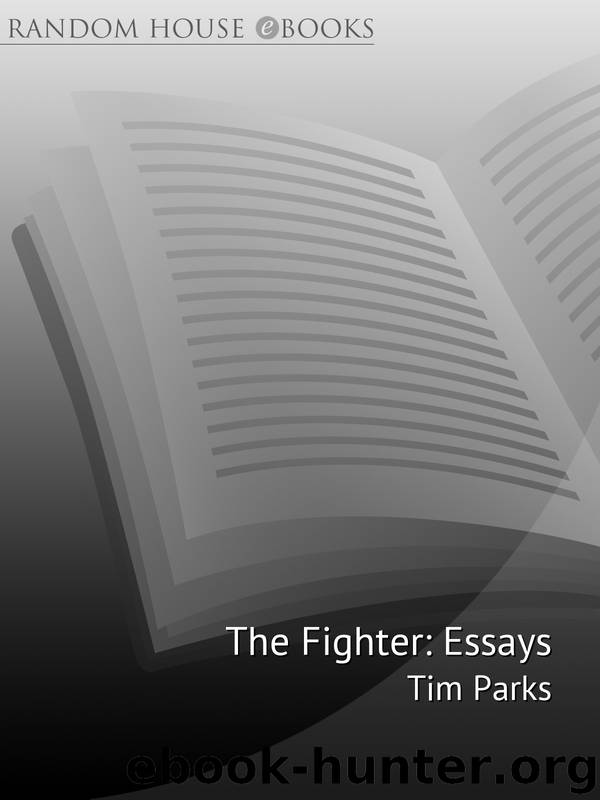The Fighter by Tim Parks

Author:Tim Parks
Language: eng
Format: epub
ISBN: 9781407020020
Publisher: Random House
A Polished Pessimism
* * *
[Emil Cioran]
‘FOR ALL THEIR merits,’ writes Emil Cioran, opening an essay ‘On Sickness’, ‘the healthy always disappoint.’1
I quote the line from memory, not because I have an excellent memory, or made any effort to memorise it, but simply because this Romanian thinker and philosopher is so memorable. Every sentence is at once eloquent and provocative, and, as his vision of the world gradually takes shape, dreadfully pertinent.
Here is another train of thought that I just haven’t been able to forget, though I read it a good year ago. Remarking, in a piece entitled ‘A Portrait of the Civilised Man’, on our determination to convert all to our likeness, Cioran declines to defend the cannibals (‘theirs is perhaps not the best humanity has produced’),2 but then takes his stand on behalf of the great masses of the world’s illiterate, ‘whom we pursue with a virulence that nothing can justify: is it such a great evil not to know how to read and write? In all frankness, I cannot think so. Indeed I will go further and say for certain that when the last illiterate has disappeared from the planet, we may dress in mourning for mankind.’3
Based in Paris after abandoning his native country to communism, Cioran published a dozen collections of essays and aphorisms. His subject is consciousness, or rather the impasse of consciousness, the irony that our greatest achievement, an increasingly refined self-awareness, has only made life more difficult. In this scenario the healthy and the illiterate of the two quotations above have something in common: they share the good fortune of a lower level of consciousness. And if we pursue the illiterate it is because, like the healthy person, they too ‘cannot help but disappoint’. ‘Do you devote yourselves to another’s conversion? You are not doing it to save him, but to oblige him to suffer like yourselves … No one saves anyone: one saves only oneself and there is no better way to do that than to clothe in convictions the unhappiness one wishes to lavish on others.’ ‘Better an innate vice’,4 the author concludes, ‘than a virtue acquired …’5
To say this is to offer only a crude introduction to the general drift of Cioran’s thought. For it is the resourcefulness and insistence with which this extraordinary thinker explores his subject, his ability to come at it from all angles, turn it inside out, wed wit and despair, find image after image for the paradoxes that beset us, that is so remarkable and so convincing. The essays included in the collection History and Utopia, perhaps the easiest of Cioran’s books with which to start, are no exception. The underlying thesis here is most succinctly (and fancifully) put as follows: ‘Man, once expelled from paradise, in order not to think about it, in order not to suffer from it, is given in compensation the faculty of will, of aspiring to action, of foundering there with enthusiasm, with brio …’6
Thus history begins: a will to action contaminated by a persistent nostalgia.
Download
This site does not store any files on its server. We only index and link to content provided by other sites. Please contact the content providers to delete copyright contents if any and email us, we'll remove relevant links or contents immediately.
Waking Up in Heaven: A True Story of Brokenness, Heaven, and Life Again by McVea Crystal & Tresniowski Alex(37758)
Still Foolin’ ’Em by Billy Crystal(36322)
Cecilia; Or, Memoirs of an Heiress — Volume 1 by Fanny Burney(32518)
Cecilia; Or, Memoirs of an Heiress — Volume 2 by Fanny Burney(31923)
Cecilia; Or, Memoirs of an Heiress — Volume 3 by Fanny Burney(31911)
Fanny Burney by Claire Harman(26577)
Empire of the Sikhs by Patwant Singh(23049)
We're Going to Need More Wine by Gabrielle Union(19016)
Hans Sturm: A Soldier's Odyssey on the Eastern Front by Gordon Williamson(18547)
Plagued by Fire by Paul Hendrickson(17385)
Out of India by Michael Foss(16836)
All the Missing Girls by Megan Miranda(15855)
Cat's cradle by Kurt Vonnegut(15284)
Pimp by Iceberg Slim(14456)
Molly's Game by Molly Bloom(14118)
Bombshells: Glamour Girls of a Lifetime by Sullivan Steve(14031)
For the Love of Europe by Rick Steves(13751)
Leonardo da Vinci by Walter Isaacson(13266)
4 3 2 1: A Novel by Paul Auster(12348)
